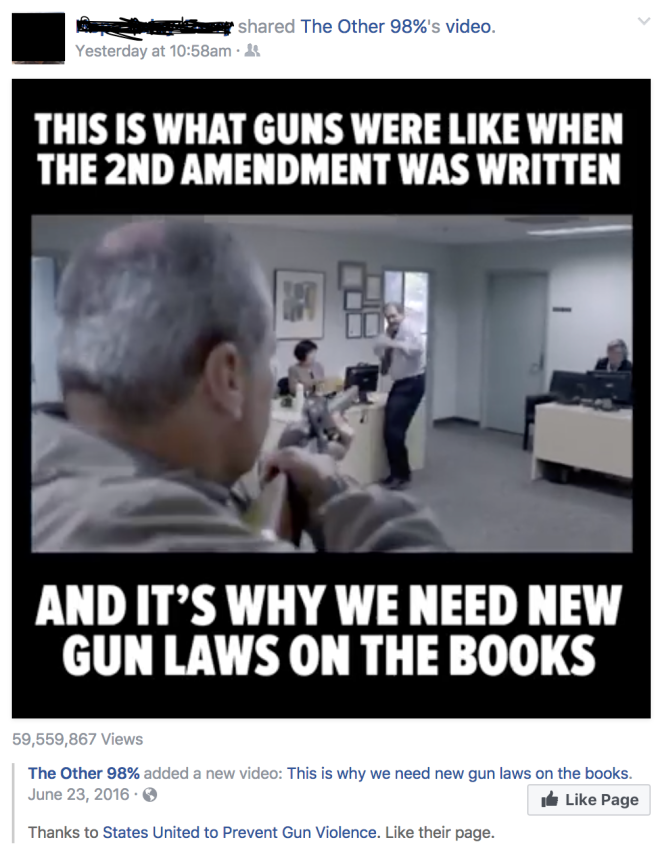When dealing with the second amendment, which guarantees the “right of the people to keep and bear Arms”, there’s a lot of emotion involved, and a lot of rhetoric. There are some awesome videos circulating which debunk a lot of commonly held beliefs about the second amendment. However, some of them can be a little condescending or otherwise just a lot of information and change for someone who doesn’t have experience with firearms. I want to keep this post tight and succinct, so we’re going to talk about one of the most common arguments we see circulating around social media: the argument that the second amendment was written several hundred years ago and therefore doesn’t apply to firearms invented after 1789 (88-91 depending on where you draw the line). Some of you might correctly identify this as a subset of the argument against an originalist reading of the constitution. The argument, at its core, is that when the second amendment was written, common “Arms” were muskets and swords. Since technology has advanced and created new and more lethal firearms, it’s necessary to write legislation to fill this gap. You can see this argument shared almost verbatim from a common progressive facebook page below.
Although we know that “views” on a facebook video are a bit inflated, 60million is still a pretty high number. This isn’t some fringe viewpoint or argument, the page has over 4.5 million likes.
We’ll ignore the fact that a short argument such as this doesn’t specify what kinds of new gun laws we need because of the limitations of making a quick, simplified, statement over the internet. However, if we accept this way of looking at the bill of rights and the constitution at large, a few comical (in a terrifying way) observations can be made.
Let’s start with the first amendment:
Congress shall make no law respecting an establishment of religion, or prohibiting the free exercise thereof; or abridging the freedom of speech, or of the press; or the right of the people peaceably to assemble, and to petition the Government for a redress of grievances.
Parallel argument: This is what press looked like when the first amendment was written *image of printing press*. This is why we need new freedom of press laws. Since the internet and computers were not invented in 1789, the founding fathers had no way of knowing how vast and powerful our sharing tools would become. We need new laws on the book to regulate what people can publish online. When the founding fathers wrote the constitution, how could they have possibly anticipated that televisions, blogs, radio or microphones would be invented? These tools give you the capability to speak freely to 1000 people per second! We need to regulate what citizens can say on these media. When they said free speech they meant in the town square, to as many people as you could yell.
Other things not protected under the first amendment: google hangouts, youtube videos, video chatting, text messaging, phone calls, megaphones, email.
The third amendment is kind of a boring one for this parallelism. I guess one could say that houses now are way bigger and have features the founding fathers couldn’t have imagined so if your house uses any post 1789 features like a two car garage? That’s not protected bro, congress can make a law saying you have to quarter 4 army dudes in your garage forever.
The fourth amendment:
The right of the people to be secure in their persons, houses, papers, and effects, against unreasonable searches and seizures, shall not be violated, and no Warrants shall issue, but upon probable cause, supported by Oath or affirmation, and particularly describing the place to be searched, and the persons or things to be seized.
Parallel argument: The founding fathers say “houses and papers”, but they didn’t say anything about your smart phone! You are not protected from seizure of your phone records, internet history, photos, documents, spreadsheets, usage data, text messages, emails, online shopping record or any form of digital communication or storage of information at all. Really anything that was invented after 1789 which can be searched, they don’t need a warrant for.
What about the fifth and sixth amendments? Sure it was reasonable to have a fair trial in front of a jury when the population of the newly-minted country was ~2.5 million people. There’s no way they could have anticipated that the population was going to grow to 320 million. Besides there are way more laws now, laws they didn’t know about. It makes it SUCH a burden to give everyone a fair trial in front of a jury of their peers.
As we can see, making an argument based on the limited foresight of the founding fathers leads to a whole lot of relativism. The bill of rights is written as a document which expressly prohibits the government from infringing on basic rights of American citizens. You can argue that you don’t want the right to bare Arms to be a basic right guaranteed to Americans, but you should be clear that that is what you are arguing for, the removal of rights currently guaranteed by the bill of rights. Just because the founding fathers didn’t know about new technology isn’t a sufficient argument for our basic rights as Americans not applying to those things. Just because the framers didn’t know that someone was going to invent an AR15 or your standard semi-automatic handgun doesn’t mean that those aren’t protected by the constitution.
